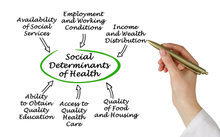Found 75 resources.
0
0
0

The findings from a Syracuse University study linking universal school meal policies with improved school attendance for young students provides a strong case for expanding free school meals, according to school nutrition and attendance experts.
Topics: Attendance, Early childhood, Education, Food insecurity, Health, Legislation & Policy, Low-income, Nutrition, Youth
 Shared by Sandra Ware
on Feb 23, 2023
Shared by Sandra Ware
on Feb 23, 2023 0
0
0
Getting regular exercise can be a challenge, but there are many positive benefits, particularly for
people with diabetes.
Topics: Exercise, Health, Healthy homes, Nutrition
 Shared by Gabe Castro
on Sep 23, 2022
Shared by Gabe Castro
on Sep 23, 2022 0
0
0
The Effects of ‘Food Deserts’ on Public Housing Residents Living with Diabetes
Topics: Energy, Exercise, Health, Healthy homes, Mobility, Nutrition
 Shared by Gabe Castro
on Sep 23, 2022
Shared by Gabe Castro
on Sep 23, 2022 0
0
0
The Low Income Investment Fund (LIIF) will moderate a unique cross-sector panel of housing and early care and education (ECE) experts on strategies and best practices for co-locating ECE facilities within affordable housing developments. Discussion of specific financing techniques and site design considerations from existing co-located facilities will provide attendees lessons on policy and programmatic changes needed to incentivize co-location. Panelists include innovators in affordable housing development, government and public sectors, early care and education operations, and community...
Topics: Advocacy, Broadband, Child welfare, CLPHA, Family engagement, Food insecurity, Health, Housing, Legislation & Policy, Low-income, Nutrition, School-readiness, Supportive housing, Sustainability
 Shared by Karina George
on Jun 17, 2022
Shared by Karina George
on Jun 17, 2022 0
0
0

In California, more than 3.7 million students were eligible for free or reduced priced school meals in the 2017-2018 school year. For many of those students, school meals are the primary source of regular access to healthy food. When the bell rings at 3:00 or lets out for summer break, many of those students go home to nutritional uncertainty or high-calorie, low-nutrient foods.
For many low-income families, the out-of-school-time food access gap increases family stress: limited budgets are stretched further to cover food, rent, utilities, transportation, medications, and chidcare costs....
Topics: Advocacy, Early childhood, Food insecurity, Health, Healthy homes, Housing, Legislation & Policy, Low-income, Nutrition, Out-of-school time, West Coast, Youth
 Shared by Linda Lu
on Dec 4, 2019
Shared by Linda Lu
on Dec 4, 2019 0
0
0
The Trump Administration is publicly weighing plans to gradually lower the official poverty line by applying a smaller cost-of-living adjustment each year. Doing so would be unjustified for several reasons.
Topics: Child welfare, Food insecurity, Legislation & Policy, Low-income, Nutrition, Stability
 Shared by Housing Is
on Jun 11, 2019
Shared by Housing Is
on Jun 11, 2019 0
0
0

This paper analyzes why SNAP benefits are inadequate, reviews the body of research showing positive effects from more adequate SNAP benefits, and offers key policy solutions to improve benefit adequacy.
Topics: Food insecurity, Health, Legislation & Policy, Low-income, Nutrition, Research
 Shared by Housing Is
on Jun 11, 2019
Shared by Housing Is
on Jun 11, 2019 0
0
0
In the United States, more than 2.7 million grandparents report that they’re primarily responsible for their grandchildren under 18. The problem is many are struggling with food insecurity because of federal rules and regulations.
Topics: Child welfare, Food insecurity, Legislation & Policy, Low-income, Nutrition
 Shared by Housing Is
on Jun 11, 2019
Shared by Housing Is
on Jun 11, 2019 0
0
0

Patients are dealing with stress related to the social determinants of health, including stable housing, food security, and adequate transportation.
Topics: Food insecurity, Health, Housing, Low-income, Nutrition, Transportation
 Shared by Housing Is
on Jun 11, 2019
Shared by Housing Is
on Jun 11, 2019 0
0
0
Community eligibility allows high-poverty schools and school districts to offer free meals to all students, and it eliminates the need for household school meal applications. A key piece of the Healthy, Hunger-Free Kids Act of 2010, community eligibility was phased in a few states at a time before it was made available to schools nationwide in the 2014–2015 school year.
Topics: Child welfare, Education, Food insecurity, Legislation & Policy, Low-income, Nutrition, Out-of-school time, Research
 Shared by Housing Is
on Jun 3, 2019
Shared by Housing Is
on Jun 3, 2019 0
0
0
Amid attacks on several food security programs from the Trump administration, this proposed change could ignite yet another debate about where we draw the line.
Topics: Food insecurity, Legislation & Policy, Low-income, Nutrition
 Shared by Housing Is
on May 28, 2019
Shared by Housing Is
on May 28, 2019 0
0
0

Food is necessary to live, remain healthy, and work. The Improving Access to Nutrition Act, introduced in the U.S. House of Representatives by Rep. Barbara Lee (D-Calif.) May 16, would keep food on the tables of people struggling to find quality employment—instead of leaving them to find a job on an empty stomach.
Topics: Asset building, Food insecurity, Nutrition, Stability
 Shared by Housing Is
on May 28, 2019
Shared by Housing Is
on May 28, 2019 0
0
0

Spring is in full bloom in Washington, D.C., and so are key pieces of legislation that FRAC is monitoring and weighing in on. Below is an overview of legislative proposals in the 116th Congress to look out for that would impact critical anti-hunger and anti-poverty programs.
Topics: Asset building, Food insecurity, Legislation & Policy, Nutrition, Seniors
 Shared by Housing Is
on May 6, 2019
Shared by Housing Is
on May 6, 2019 0
0
0
The U.S. economy is enjoying nearly a decade of expansion since the Great Recession. Yet food insecurity -- a lack of money or resources to secure enough to eat -- still grips almost one in eight Americans. That's roughly 40 million people. While slowly improving, that figure remains stubbornly higher than before the recession, when more than one in 10 U.S. residents had difficulty knowing when and how they might eat next, according to data from the U.S. Department of Agriculture.
Topics: Food insecurity, Health, Low-income, Nutrition
 Shared by Housing Is
on May 6, 2019
Shared by Housing Is
on May 6, 2019 0
0
0

That’s according to the fourth and largest survey of college students’ ability to afford food and housing
Topics: Food insecurity, Low-income, Nutrition, Post-secondary, Research, Youth
 Shared by Housing Is
on May 6, 2019
Shared by Housing Is
on May 6, 2019 0
0
0
Moving Health Care Upstream (MHCU) is based on the belief that health systems can address persistent and costly health inequities by moving “upstream”—beyond the walls of hospitals and clinics and into the communities, collaborating with community-based organizations to address the root causes of disease. The various areas of work within MHCU share a common focus-supporting hospitals and community stakeholders in testing and spreading strategies to move upstream, and sharing “what works” to inform the field and accelerate the upstream movement in the field as a whole. Policy Learning Labs are...
Topics: Child welfare, Early childhood, Food insecurity, Green, Health, Housing, Legislation & Policy, Nutrition, Partnerships, Youth
 Shared by Housing Is
on May 1, 2019
Shared by Housing Is
on May 1, 2019 0
0
0
Congress has an important opportunity in 2019 to improve the health of millions of our nation’s children by passing a strong reauthorization that protects and strengthens the child nutrition programs. These successful, cost-effective federal nutrition programs play a critical role in helping children in low-income families achieve access to child care, educational, and enrichment activities while improving overall nutrition, health, development, and academic achievement.
Topics: Child welfare, Early childhood, Food insecurity, Funding, Legislation & Policy, Low-income, Nutrition
 Shared by Housing Is
on May 1, 2019
Shared by Housing Is
on May 1, 2019 0
0
0
Sweeping changes designed to make the food more nutritious in a federal assistance program for low-income families reduced the risk for obesity for 4-year-olds who had been on the program since birth, according to new research.
Topics: Early childhood, Food insecurity, Low-income, Nutrition, Obesity, Research
 Shared by Housing Is
on Apr 29, 2019
Shared by Housing Is
on Apr 29, 2019 0
0
0

Are you a Pennsylvanian without a high school diploma? Then sign up with AmeriHealth Caritas for Medicaid and the plan will help you get your GED. Having trouble getting a job in Ohio? If you are enrolled in CareSource, the Life Services JobConnect in CareSource’s managed care organization (MCO) will arrange job coaching and other employment services at no cost. These are not examples of corporate philanthropy. Rather, they reflect a growing recognition in the health care sector, especially among managed care organizations, that good health—and achieving lower medical costs—requires a focus...
Topics: Education, Food insecurity, Health, Housing, Low-income, Nutrition, Research
 Shared by Housing Is
on Apr 25, 2019
Shared by Housing Is
on Apr 25, 2019 0
0
0
In the United States, nearly 13 percent of people are food insecure, living without reliable access to basic nutrition. But the problem is even more dramatic on college campuses, where a recent study found that 48% of students report food insecurity and live without regular access to food.
Topics: Food insecurity, Nutrition, Post-secondary, Youth
 Shared by Housing Is
on Apr 22, 2019
Shared by Housing Is
on Apr 22, 2019 0
0
0

Ballooning lunch debt is a problem for families and schools across the country. And it's evidence of a broken school lunch system that uses students’ needs as collateral to leverage money from parents.
Topics: Food insecurity, Health, Nutrition
 Shared by Housing Is
on Apr 22, 2019
Shared by Housing Is
on Apr 22, 2019 0
0
0

When it comes to the federally funded Afterschool and Summer Meal Programs, what is the trick to engaging teens better? Across the country, both anti-hunger advocates and out-of-school time program providers are asking themselves this very question.
Topics: Food insecurity, Nutrition, Youth
 Shared by Housing Is
on Apr 22, 2019
Shared by Housing Is
on Apr 22, 2019 0
1
1

In 2015, the Supplemental Nutrition Assistance Program (SNAP) prevented 8.4 million people from living in poverty. This essential and effective safety net program helps people with low incomes purchase food for themselves and their families—an estimated 40.8 million Americans were living in poverty in 2015; absent SNAP benefits, that number would have been 49.1 million. Despite its success, SNAP is facing rule changes that would cause people to lose benefits—harming those who need it most and weakening the poverty-fighting power of the program.
Topics: Food insecurity, Health, Legislation & Policy, Low-income, Nutrition
0
0
0

Puerto Rico was in financial distress and had crumbling infrastructure before Hurricane Maria, and many residents complain of government malfeasance that exacerbated the storm’s impact, echoing criticism from Washington. But Puerto Rican leaders say the delay to the Vieques hospital and thousands of other stalled projects is a reflection of unequal treatment from the White House and Congress, which last week failed to pass disaster relief legislation because of a dispute over how much money to send the island.
Topics: Community development, Food insecurity, Funding, Legislation & Policy, Low-income, Nutrition, U.S. Territories
 Shared by Housing Is
on Apr 15, 2019
Shared by Housing Is
on Apr 15, 2019 0
0
0
This podcast episode features the work of the Hunterdon County Partnership for Health, a multi-sector coalition that includes over 60 community agencies that share a common interest in improving health in Hunterdon County, NJ. Kim Blanda is a Project Director at Hunterdon Healthcare, Dr. Rose Puelle is a Senior Director of Population Health at Hunterdon Healthcare, and Karen DeMarco is the Director of the Hunterdon County Department of Health. Together, they are working on a project funded by New Jersey Health Initiatives (NJHI) focused on healthier weight as a mechanism for improving...
Topics: Data sharing, Health, Nutrition, Obesity, Partnerships
 Shared by Housing Is
on Apr 8, 2019
Shared by Housing Is
on Apr 8, 2019 
